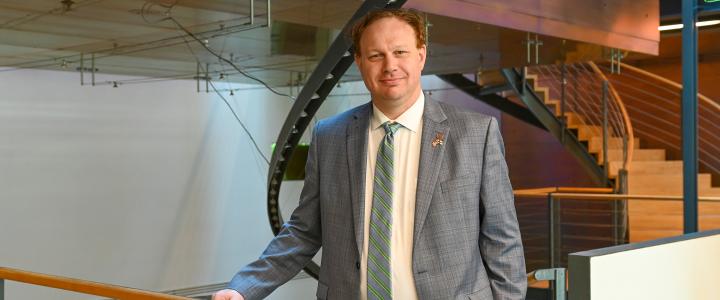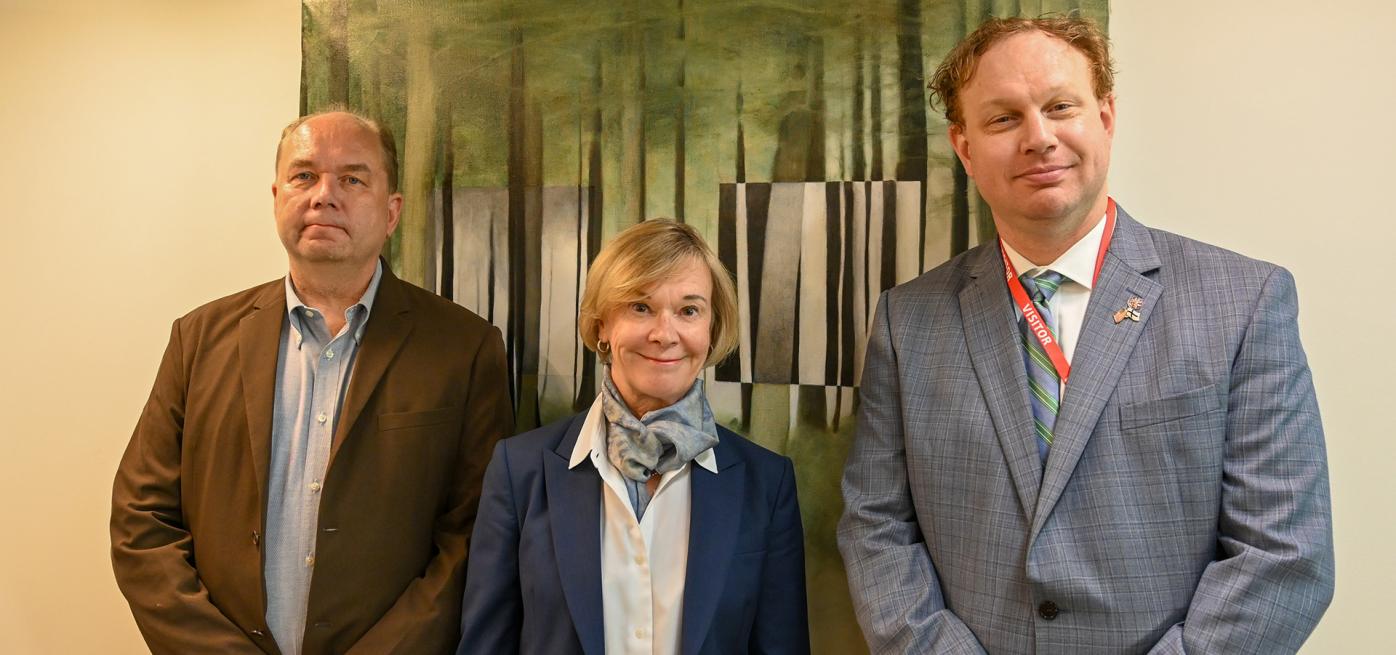

With the 2024 U.S. elections just around the corner, it seems an appropriate time to talk with an expert on the subject: Peter Miller, who is a Senior Research Fellow at The Brennan Center for Justice in New York City, and a Fulbright Finland alumnus.
Born and raised in Montana, and with a doctoral degree from the University of California, Irvine, Peter’s trajectory into the world of election law and redistricting took a crucial - and, he says, surprising turn with the publication of his graduate dissertation, written as various states, including California, were establishing independent redistricting commissions. The dissertation made an impact well beyond his expectations, cited in a high-profile Supreme Court case over Arizona’s Independent Redistricting Commission.
"It was luck more than anything," Peter smiles. “I went from being an unknown graduate student to being cited by the late Justice Ruth Bader Ginsburg. I would not have believed any of this could happen. The Supreme Court citation came out of nowhere. The Fulbright was a delightful surprise. And then if you had told me I was going to land in New York City, I wouldn’t have believed you at any point. I grew up in the West, and never imagined I would be living in the biggest city in the U.S.”
This unexpected recognition paved the way for the next steps in Peter’s career, firstly securing a Fulbright Scholarship to Finland’s Tampere University in 2016-17 and, on his return to the United States, joining the Brennan Center for Justice as a Senior Research Fellow in 2018, focusing on U.S. and comparative politics, voting behavior, political institutions, and public opinion.
From Scholar to Public Commentator in Finland
What attracted Peter to Finland? He explains that his research project at Tampere University focused on comparing early voting trends in the United States and Finland, two countries with high levels of early voting but with political and electoral systems that are “dramatically different in every other regard,” Peter explains. “I wanted to see if there are common motivators for when people decide to cast their ballot before the end of a campaign.”
But Peter’s scholarship year in Finland held another twist of fate in store: the polls-defying outcome of the 2016 U.S. elections.
“Here too, luck intervened,” he recalls. “Everything was going very well. I was well on my way, I was based at Tampere University, and the Finnish Social Science Survey Archive is there. I had a bunch of election surveys that I was looking through... and then the election happened, and suddenly the entire nation of Finland was concerned how the polls got the election wrong. What does this foretell for U.S. and Finland relations, or the United States’ role in the world?”
“And so suddenly I became the guy that everyone wanted to talk to about American politics,” he smiles.

While he settled into Finnish academic life, Peter found himself increasingly in demand as a commentator on the U.S. elections and political system, interviewed by Finnish journalists, described in the Finnish media as an “election observer”, and called on to give public talks.
“At one point, I was told 1 500 people had attended my lectures throughout the year,” he says. His outreach work also gained the attention of the U.S. Embassy, who congratulated him on his work in helping Finns understand the complexities of the U.S. electoral system.
“Finland left a pretty indelible mark on my career trajectory, not just maturing as a scholar, but becoming someone who articulates ideas in public. I wasn’t just someone that sits in a library and produces articles. That turned out to be a delightful aspect of the Fulbright I hadn’t anticipated, but it’s a far more enduring one, I think.”
Transforming Research into Action at the Brennan Center
On his return to the U.S., Peter joined the Brennan Center for Justice in 2018. The Center, based at NYU School of Law, is renowned for its work in law and policy, specifically around issues of democracy and justice. Here, Peter’s expertise in redistricting and data analysis has been instrumental in addressing contentious issues such as partisan gerrymandering and redistricting.
“It’s mostly lawyers at the Center, but I’m one of eleven social scientists on staff, and my role is to conduct all the quantitative analysis related to redistricting across the United States,” he explains.
A recent example of his work is the Brennan Center’s involvement in litigation over redistricting in Ohio. The team successfully argued before the Ohio Supreme Court that legislative maps were unconstitutionally gerrymandered. Peter played a crucial role in this process, by analyzing the data and offering insights into the impact of these maps on fair representation.
“A lot of my work there involved assessing the maps, working with expert witnesses, talking to lawyers about social science concepts and trying to assist them with the arguments they were making before the Court,” he explains.
This analytical work, he says, is among his favorite aspects of the job. “Using social science to advocate for a better and more equitable American democracy is something I find incredibly rewarding.”
A Nonpartisan Fight for Fair Voting
The Center is strictly nonpartisan, he explains, actively monitoring efforts to limit voter participation and seeking to counter policies that could undermine the accessibility of voting.
“One of the things we do is examine voter roll purges and see if there's a pattern of discrimination or bias,” Peter explains. “So, if a state decides to remove 100 000 people from the voter rolls, we try and get hold of the data and see who’s actually being removed.” He adds that this analysis can reveal disparities that disproportionately affect marginalized groups, and when necessary, the Brennan Center files lawsuits to challenge unfair practices.
Peter’s background in social science brings a different, complementary perspective to the Center’s legal strategies. His work often involves exploring the impacts of polling place locations, early voting policies, and voter ID laws, using data to support the Center’s advocacy efforts.
“Our role is to ensure that voting is fair, equitable, and accessible to everyone, regardless of the political outcome,” he emphasizes.
Comparing Voting and Elections in the U.S. and Finland
Peter credits his experiences as a Fulbright Scholar with providing him the opportunity to see his work from an international perspective, enriching his understanding of how electoral systems differ around the world - and specifically contrasting approaches in the United States with Europe.
“In Finland, and more broadly in Europe, voting is seen as a civic duty provided by the state, whereas in the U.S., it’s often viewed as a right individuals have to assert… It just seems like there is a much more political approach to these voting questions in the U.S. that are largely absent in European countries,” he notes.
“I think it goes back to the nature of two-party contestation in the United States. Only one party can win an election, so I worry that one party or the other has from time to time said, well if we adopt policy X, we will lose votes, and therefore they’re opposed to the policy. The policy might be a good idea, but the lens it’s considered through is ‘do we get an advantage?’. I think that’s not as present in European systems to the same degree.”
“Redistricting is the most technical aspect of voting, and yet is often resolved by the courts, but this doesn’t occur in European countries. In Finland, for example, the parliamentary districts are based on provincial lines, and these don’t change very often. They also elect multiple members of parliament in each district. Because the U.S. elects a single person from one district, I think that provides an incentive to try and manipulate the district drawing process,” he adds.

Fulbright Turns Countries into People
The Fulbright program’s emphasis on cultural exchange aligns closely with his own philosophy of democratic participation, he explains. “Fulbright’s initial vision was to turn countries into people,” he says. “It’s really an unparalleled opportunity that Fulbright provides, and speaks to the wisdom of the need for international and intercultural understanding.”
“You have this vague concept of another country, as you study it from your office, but actually going there and living amongst the people, talking to Finns, reading the news, discussing the newspaper with colleagues.” Peter recalls various experiences - cross-country skiing in Lapland, celebrating Finnish traditions such as Vappu, trying out the Finnish sauna.
“It’s those sorts of happenstance opportunities, but also just the ability to really devote yourself to living in a country for a while, getting to know the people there, through a really deep and focused residence in the country. I think it’s wildly successful - it absolutely changed my life”.
Peter says that the friendships and collaborations he has built through the program continue to influence his work, even as he tackles some of the most pressing issues in American democracy today. He has been back to Finland, as the external examiner, or “opponent” on a doctoral dissertation defense, and research collaboration continues with former colleagues from Tampere.
“One of the head-scratching elements of the Fulbright was the realization that Finland previously had an Electoral College but eliminated it in the early twentieth century,” he says, noting he is now working with one of his former students on a project to analyze this decision and the parliamentary debate that preceded the vote.
Peter also remains connected to the wider Fulbright community, through regular events organized by the Fulbright Finland Foundation in the United States. “It’s exciting to think, this was a great opportunity, so what can I do to make sure that the future also has that opportunity?”
Ensuring Everyone Has a Voice
In the lead-up to the current U.S. elections, due to take place Tuesday, November 5, 2024, Peter and his colleagues at the Brennan Center remain focused on ensuring fair voting practices across the country.
“I see our work as a constant battle to safeguard democracy,” he says.
“We are fighting to ensure that everyone has a voice, and that those voices are heard in a fair and equitable system."




